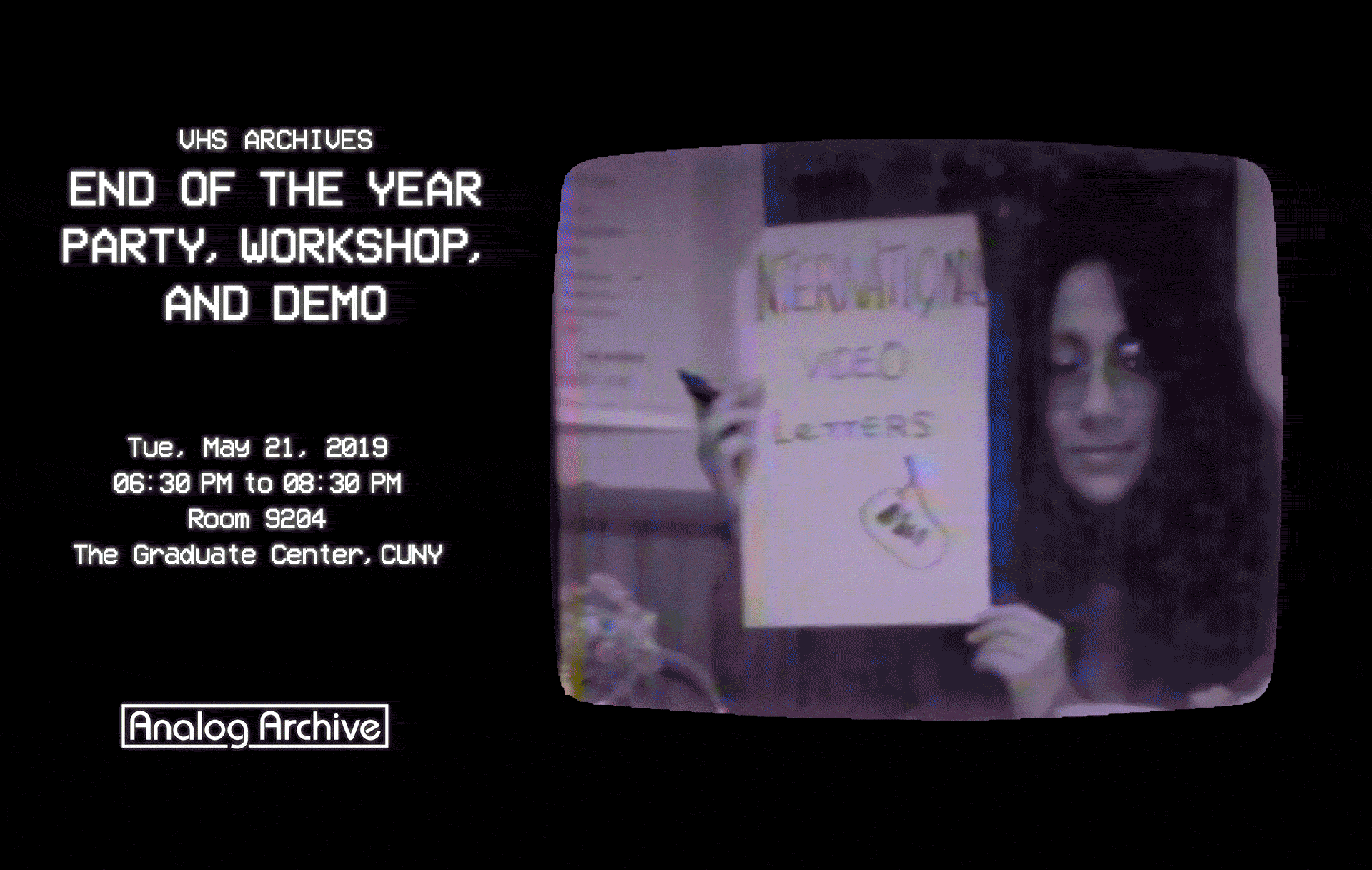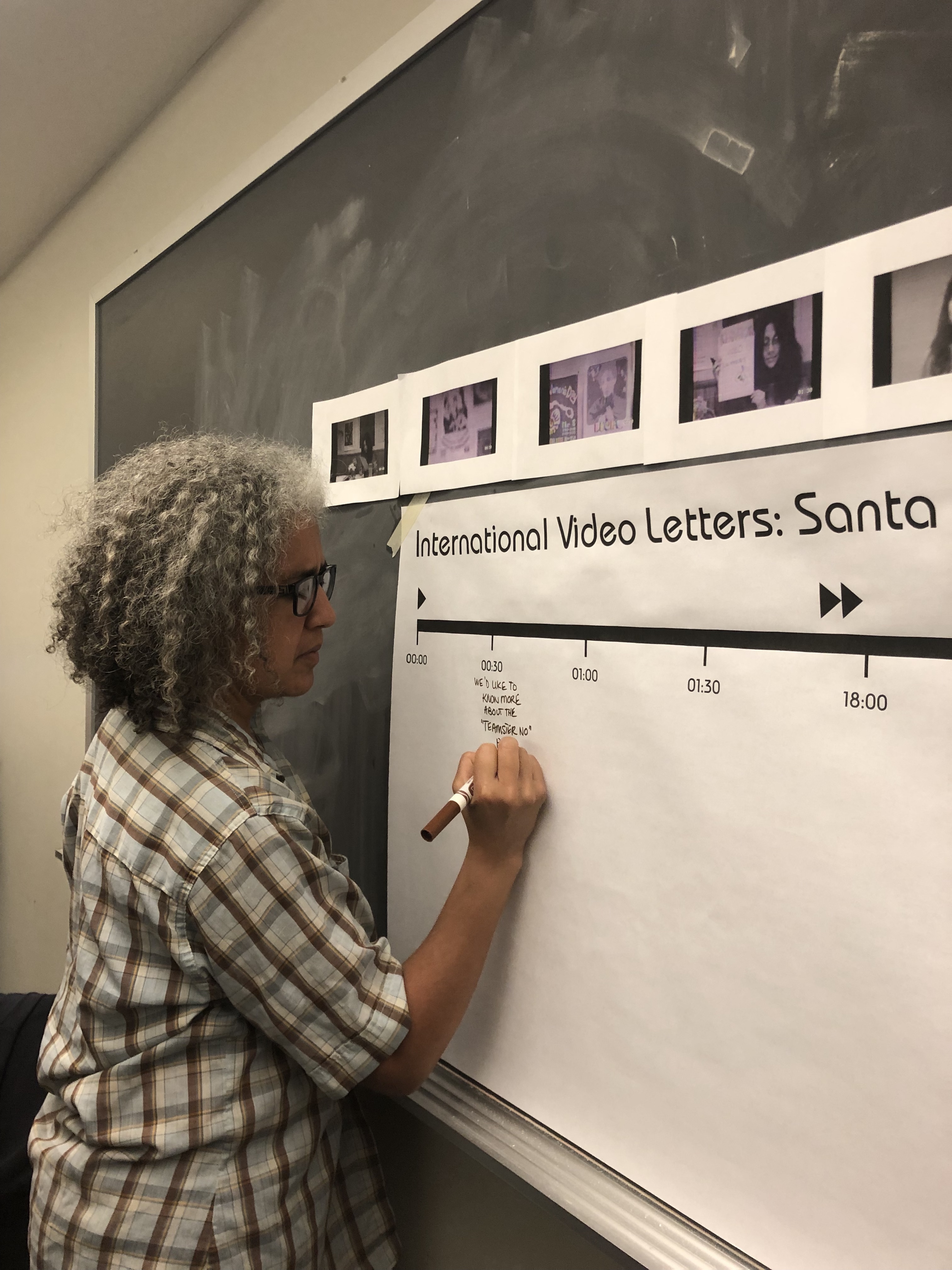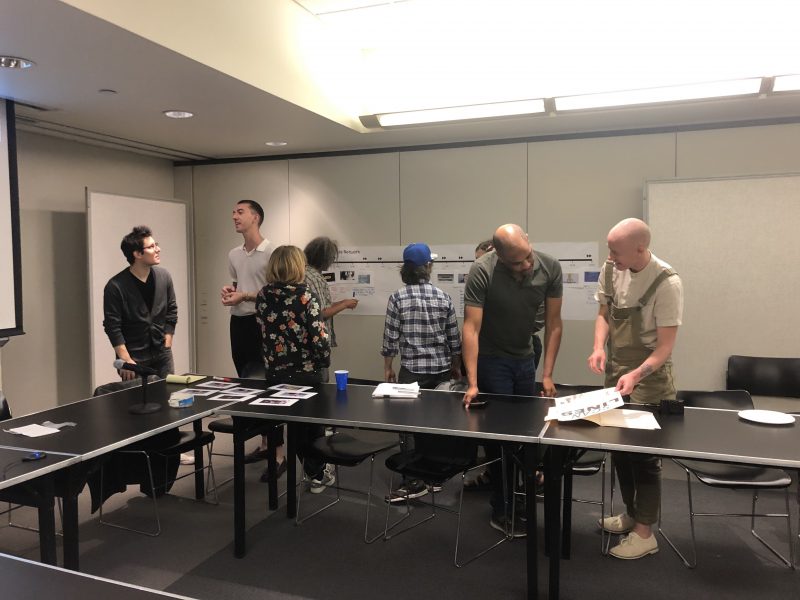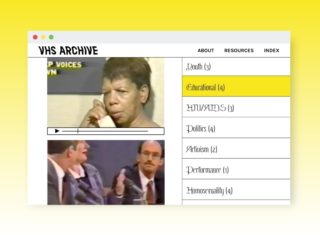Alexandra Juhasz
The VHS Archives working group closed out its second year with an End of the Year Party, Workshop, and Demo.

While “party” had been serving as a metaphor during our 2018-2019 meetings to express our commitments to creating opportunities for enjoying and using archives together, this time we were not playing around, nor were we metaphorical in the least. There was food and drink supplied by the Center for the Humanities. Folks from outside our working group (but kindred to our quest) came because we invited them. And we had "party games": archival activities to engage digital collections of once-analog things with humans interacting with them, as we had been conceptualizing all year.
There were guests of all stripes at our party: our collective members, people who had been involved in the two tapes we screened when they were made, and those simply interested in our working group's core commitments to queer and feminist video, especially that attentive to AIDS, sexuality, people of color, and trans people.
There was teaching and talking and sharing.
We acquired stuff, and we touched it too.
For reasons important to our theorizing about, digitizing, and using the tender once-analog materials of the small radical groups of people who matter to us, we felt it was important to start with paper, as well as tape. Kyle Croft explains our thinking in “What are we asking from Lucretia? What work do we need this tape to do?” his write up of the party he had held earlier. Kyle shared clips with us from a video interview with Lucretia Critchlow [visualaids.org], one of the first Artist Members of Visual AIDS: "The aim of our work is to leverage historical materials as prompts for present-day activity, allowing contemporary concerns to animate these analog archives while remaining intentional about how we are shifting the context, access, and visibility of these tapes."

Digitization is a useful afterthought for creating other afterlives, but our tool (developed by Partner and Partners) does things different from what is currently available. It is neither for storage (we suggest you go to the Internet Archive for that) nor a comprehensive collection creator (that would be the making of a database or an archive). No, ours is a tool for small stacks of analog materials. It allows groups of like-minded people to be together with those things as well as each other; to engage with the past that tape stores and signals while enjoying it (again, differently) in the present; to register related things and feelings still alive and usable now, even if made before; and to use all this for a better, or at least better-informed, now, especially one aligned with and continuing the movements that made and seek historical traces. To do this, we need to ask and try to answer the hard questions raised by records and their people.
We are not alone in this digital effort. In his Introduction to Porn Archives (Duke 2014), Tim Dean (ed., with Steven Ruszczycky and David Squires) writes about a different but kindred tender archive, one also "unofficial and outside state approbation," and one that is not, and never was dusty ... just juicy! Like the Porn Archive, we are collecting and using records that hold both "information and affect" of pleasure (and struggle) which would "otherwise be transient and ephemeral, allowing intimacy to enter archives" and in our case also pain, vulnerability, loss, power, and trauma.”
As is true for the Porn Archive, we celebrate the whims, passions, and limits of our kindred collectors and users, ideally all members of the same (our) community. As is true for the Porn Archive, "likely to be incomplete, disordered, irreducibly subjective," ours is small, sweet, and tender. To use it requires that you think through the ethics of taking and moving forward another person's thoughts and feelings, as well as their images and traces of their bodies. It's really clear how important that is when that person (from a tape) is with you live in the room!
Here's how group member Tara Mateik asks these questions about his, our second, party in Hard Copies: Homecoming Queens: "How does the significance of a home movie shift if you don’t have a home? For those who grew up in institutions, foster care, shelters, detention centers, what documents remain? What does the record convey without first person narratives?"
In The Feminist Bookstore Movement: Lesbian Racism and Feminist Accountability (Duke 2016), Kristen Hogan discusses the linked "emotional-political alliance" that informed the feminist bookstore community's commitments to sharing, storing, and supporting books. Hogan’s notion of “the feminist shelf”—“a practice of ethical feminist reading practices that in turn informed relational practices”—resonates with those we are attempting to build into our tool for ethical, active, communal internet saving, sharing, supporting, and use.
Our "shelf" is a table with shared stuff.
Our still-developing Analogue Archive tool and website is built from our belief that digital places and experiences can, like the analog "feminist shelf," support ethical holding and the facilitating of things we make and have made, as well as how and who uses them and why. Outside of systems of more, or money, or total-anything, we hope to engender archival encounters and practices that are real life parties rooted in the good, hard, radical things we made and still need.
Although our party is over, here's the invite (which holds links to many of the digital things we engaged, and that can still be engaged):
Please join the VHS Archives Working Group for a public unveiling and participatory party where our light-weight video archiving tool will be demoed and then played with by all.
We will screen clips from two videos through our ANALOG ARCHIVES tool built by Partner & Partners:
- Clips from Gay Cable Network, Gay USA, September 20,1990 (selected by Kyle Croft, from Visual AIDS)
- Clips from Santa Cruz Women's Media Collective, International Videoletters project, 1975 (selected by Helena Shaskevich, CUNY GC, Art History)
We will add material items to a paper timeline that will then be digitized in front of our eyes!
And here's a video record of the party if you'd like to see and hear more.
Keep your eye out for year three of the Working Group, as we share the Analog Archive tool with interested CUNY GC faculty and students.



